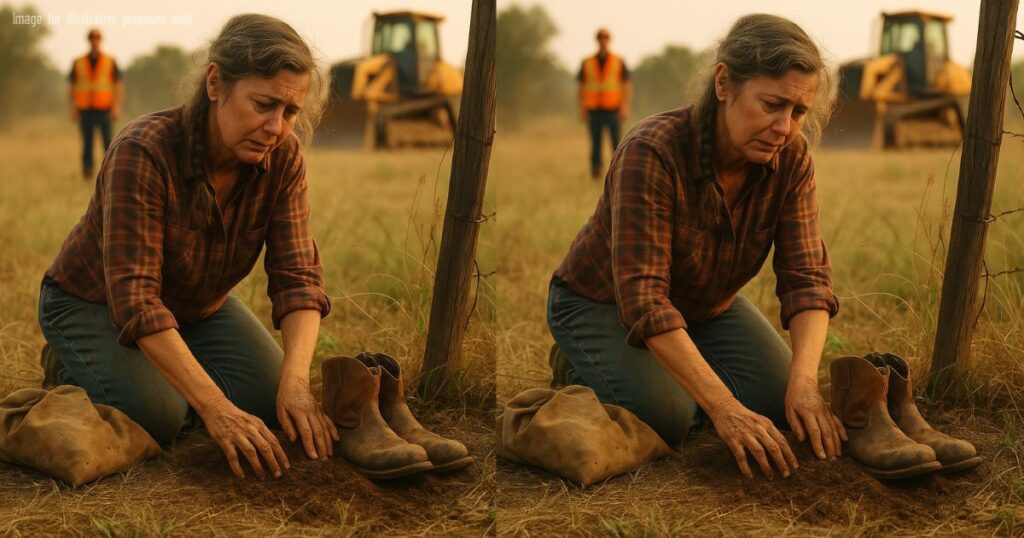They say land can’t cry — but I heard it weep when the bulldozers came.
It wasn’t the roar of the machines that got to me. It was the silence right before.
The birds stopped singing. The wind curled into stillness. And for a second — a full, painful second — the farm held its breath, like it knew what was coming. Like it remembered everything, too.
I’d promised myself I wouldn’t come back.
But I did.
Just after dawn, with coffee still sloshing in a thermos and last night’s tears dried stiff on my face. The boots in the sack still sat beside the last post, quiet and heavy, like they knew something sacred was about to be disturbed.
I slipped them out and looked at them one last time.
Daddy’s boots.
The soles were almost gone, cracked straight through the ball of the foot. Laces snapped and knotted. One had a smear of green paint from when he tried fixing the tractor with too little light and too much stubbornness.
I should’ve kept them. Displayed them. Cleaned them up and told their stories to people who’d never know the man who wore them.
But they didn’t belong on a shelf.
They belonged here.
I dug with my hands.
The dirt by the post was dry and bitter — the kind that sticks under your nails and won’t let go. I cleared a space deep enough, wide enough. Dropped the boots in gently, like laying down an old friend.
Then I did something I hadn’t planned.
I took off my own boots — scuffed but whole — and swapped them for Daddy’s.
I stood, wobbly at first. The toes pinched. The left sole was lopsided from a lifetime of walking with a slight lean he never admitted.
They didn’t fit right.
But they fit enough.
And I wore them to stand tall as the bulldozers came.
The man from yesterday saw me and waved, uncertain. He looked like he wasn’t sure if I was a protestor or a ghost.
I raised my hand in return, calm.
“I just want a few minutes,” I said.
He nodded. Told the crew to wait.
That was kind of him. Or maybe he saw something in my face — the lines, the resolve — that said this woman ain’t movin’ until she’s ready.
I walked along the fence one last time. The line Daddy and I never finished.
In places it sagged. In others, it held firm — the wire taut like it remembered what strength used to feel like. Each post was a chapter. This one we did in ’96, after the big ice storm. That one? Spring of ’02, right after Mama’s cancer diagnosis. I could trace our whole life in knots and staples and dirt.
It’s funny what fences remember.
They mark what was yours — and what was never really yours to keep.
We were poor, but proud. Daddy always said pride didn’t cost a thing, but it was the most expensive thing to lose.
He hated loans, never took one. Bartered hay for repairs, gave eggs to neighbors in exchange for diesel fuel. When money got tight, he mended everything — the truck, the roof, my heart when boys from town laughed at my boots and crooked teeth.
“This land,” he told me once, “isn’t about money. It’s about meaning. And if you listen close, it’ll tell you who you are.”
I didn’t understand that when I was seventeen and mad that I didn’t get to go to prom because the septic tank collapsed and we spent the whole damn weekend digging in the cold.
I understand it now.
When I walked back to the last post, the sun was up. The light was that kind of Texas gold — not gentle, not soft, but honest. It lit every wrinkle, every weed, every truth.
I dropped to my knees.
From the pocket of my flannel shirt, I pulled out a little paper envelope. Inside were seeds — wild bluebonnets, Daddy’s favorite. He never admitted it, of course. But I saw the way he slowed down when they bloomed along the highway.
I scattered them gently over the dirt where the boots now rested. Covered them with earth. Pressed my palm flat against the mound.
“Grow,” I whispered. “Even if they don’t deserve you.”


